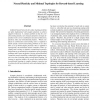Free Online Productivity Tools
i2Speak
i2Symbol
i2OCR
iTex2Img
iWeb2Print
iWeb2Shot
i2Type
iPdf2Split
iPdf2Merge
i2Bopomofo
i2Arabic
i2Style
i2Image
i2PDF
iLatex2Rtf
Sci2ools
112
click to vote
HIS
2008
2008
Neural Plasticity and Minimal Topologies for Reward-Based Learning
Artificial Neural Networks for online learning problems are often implemented with synaptic plasticity to achieve adaptive behaviour. A common problem is that the overall learning dynamics are emergent properties strongly dependent on the correct combination of neural architectures, plasticity rules and environmental features. Which complexity in architectures and learning rules is required to match specific control and learning problems is not clear. Here a set of homosynaptic plasticity rules is applied to topologically unconstrained neural controllers while operating and evolving in dynamic reward-based scenarios. Performances are monitored on simulations of bee foraging problems and T-maze navigation. Varying reward locations compel the neural controllers to adapt their foraging strategies over time, fostering online reward-based learning. In contrast to previous studies, the results here indicate that reward-based learning in complex dynamic scenarios can be achieved with basic p...
Related Content
| Added | 29 Oct 2010 |
| Updated | 29 Oct 2010 |
| Type | Conference |
| Year | 2008 |
| Where | HIS |
| Authors | Andrea Soltoggio |
Comments (0)

